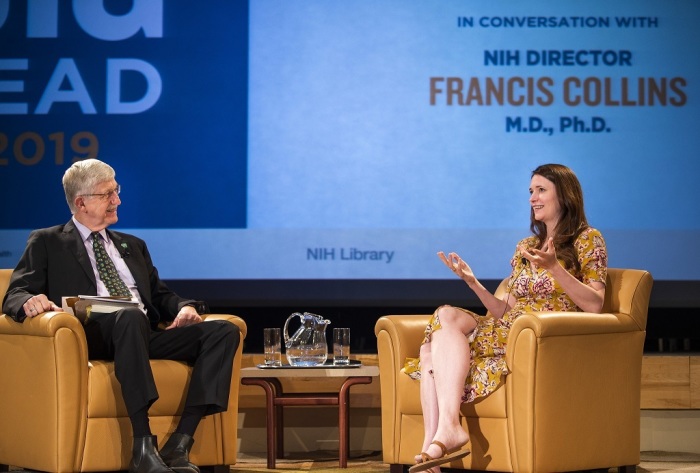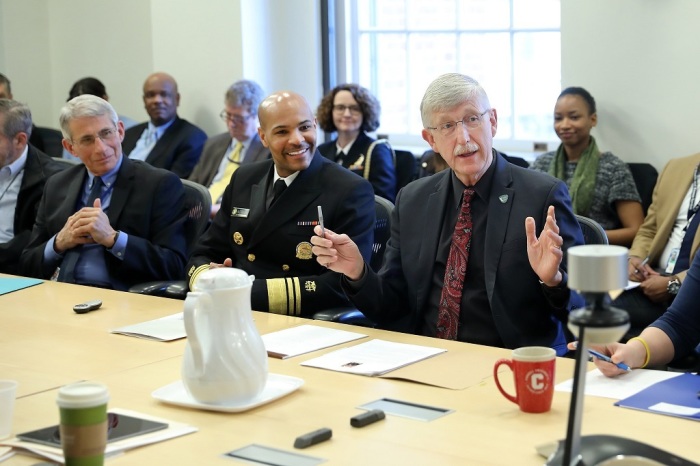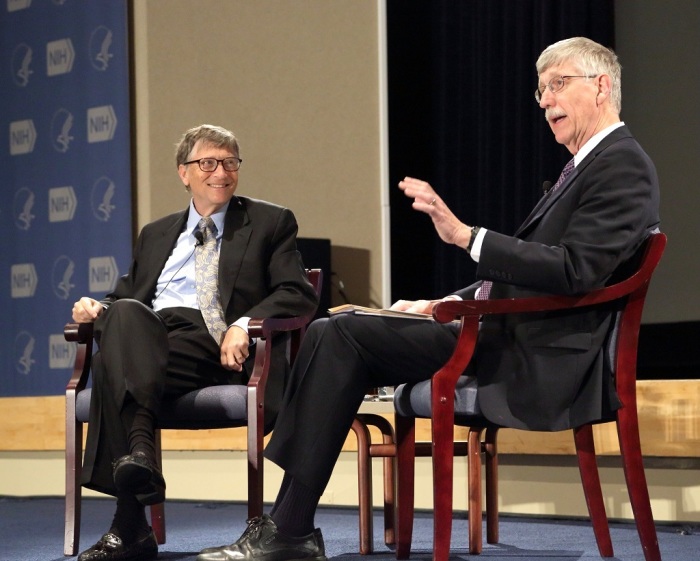NIH head Francis Collins wins $1.3M Templeton Prize for his witness to faith and science

U.S. National Institutes of Health Director Francis Collins, a devout Christian geneticist, is the 2020 winner of the Templeton Prize, a financial award of $1.3 million that honors his storied career of using science to advocate for the “integration of faith and reason.”
“It is a distinct honor, and one which is particularly appropriate in these challenging times, to announce the winner of the 2020 Templeton Prize, Dr. Francis Collins — geneticist, physician, director of the U.S. National Institutes of Health, and one of the most prominent and respected scientists in the world,” Heather Templeton Dill, president of the John Templeton Foundation and granddaughter of the late philanthropist Sir John Templeton, said in a statement Wednesday.
“Throughout his long career, Dr. Collins has advocated for the integration of faith and reason, demonstrating how religious faith can inform and inspire a rigorous quest for knowledge of the natural world through the sciences.”
The Templeton Prize is one of the world’s largest annual individual awards. The award honors individuals whose exemplary achievements advance Templeton’s philanthropic vision: “harnessing the power of the sciences to explore the deepest questions of the universe and humankind’s place and purpose within it.”
Collins, 70, has advanced that vision throughout his career as he led the Human Genome Project to its successful completion in 2003. The project resulted in the mapping and sequencing of the 3 billion DNA letters that make up the human genetic instruction book.
Before his work at the NIH, he also served as a professor of internal medicine and human genetics at the University of Michigan. At the university, he was known as the “gene hunter” for pioneering the technique of “positional cloning” to pinpoint disease-related genes the foundation noted.
His research helped lead to the discovery of the genes responsible for cystic fibrosis and neurofibromatosis.
“Motivated by his own sincere Christian belief, Dr. Collins regards his scientific vocation as a geneticist not only as a means to decipher what he calls ‘the language of God,’ but also as an act of worship of the divine,” Templeton Dill said. “Francis Collins embodies the ideals and core convictions that inspired my grandfather, Sir John Templeton, to establish the Templeton Prize in 1972: that rigorous research, especially in the sciences, can help humanity confront the deepest and most challenging questions of existence.”

Born April 14, 1950 in Staunton, Virginia to secular parents, Collins is the youngest of four sons, according to a fact sheet on Collins provided by the foundation.
In 1966 after he graduated high school at age 16, Collins enrolled at the University of Virginia where his “rather superficial” personal exploration of various religions led him to find comfort in the noncommittal nature of agnosticism.
After he graduated from the University of Virginia in 1970, however, he began a Ph.D. program in physical chemistry at Yale University, where he became an unapologetic atheist.
Collins, at the time, equated belief in God with intellectual suicide, according to the foundation.
His turning point with God came in 1976 while he was a third-year medical student at the University of North Carolina, Chapel Hill.
Collins found himself deeply touched by how often his patients looked to their faiths to provide solace in the face of death.
He began searching for God after one of his patients asked him about his faith and he was unable to give an honest answer despite his atheism.
A Methodist minister, who was also his neighbor, would later loan him a book called Mere Christianity by C.S. Lewis during a visit. Seeing the faith through the lens of a former atheist like Lewis helped shape Collins’ journey to Christianity over the next several decades.
“When I transitioned from quantum mechanics to medical school, I found these questions hard to ignore while sitting next to the beds of the sick and dying, and science wasn’t much use in tackling them," Collins explained in a statement. "People of faith seemed to claim wisdom in that domain, but I assumed those insights were based on superstition and fundamental misunderstanding of nature. Seeking to dismiss the faith perspective, I was stunned to discover a rich vein of philosophical and theological thinking."

“Atheism, the denial of the possibility of anything that science couldn’t measure, emerged as the most irrational and impoverished worldview," Collins added. "And to my amazement, pointers to a Creator began to appear in all sorts of places, even including scientific observations about the universe. Most importantly, the person of Jesus emerged as the most profound truth-teller I had ever encountered, and called on me to make a decision about my own belief. I held off the Hound of Heaven as long as I could, but ultimately resistance was impossible.”
Collins wrote his 2006 New York Times bestseller, The Language of God: A Scientist Presents Evidence for Belief, to recount his journey from agnosticism to atheism to Christian belief.
The book explains why science is not in conflict with the Bible. The book also outlines how modern science and robust personal faith can intersect. It became an instant New York Times bestseller and stayed on the bestseller list for 16 weeks.
A year later, inspired by the response to his book and seeing the need to create a platform for further dialogue about science and religion, Collins and his wife founded the non-profit BioLogos. BioLogos exists to foster discussions about the harmony between science and biblical faith.
That same year, 2007, Collins was also awarded the Presidential Medal of Freedom, the highest civilian award in the United States, by President George W. Bush.
In addition to being confirmed by the U.S. Senate as the 16th director of the NIH in 2009, he went on to receive numerous other awards for his work as he continued writing.
“I certainly never expected to have a leading voice in the science-faith debates,” Collins said in his statement.
But to his surprise, The Language of God “seems to have found a resonance with many seekers.”
“It is truly gratifying to see and celebrate the community of scientists and believers that have rallied around this joyful synthesis,” he said. “In Matthew 22:36-37, Jesus is asked by the disciples to name the greatest commandment in the Law. He responded, ‘Love the Lord your God with all your heart and all your soul and all your mind.’ Our minds were supposed to be involved in this! That means that science is not only a stimulating intellectual exercise, not only an amazing detective story — it can also be a form of worship.”



























